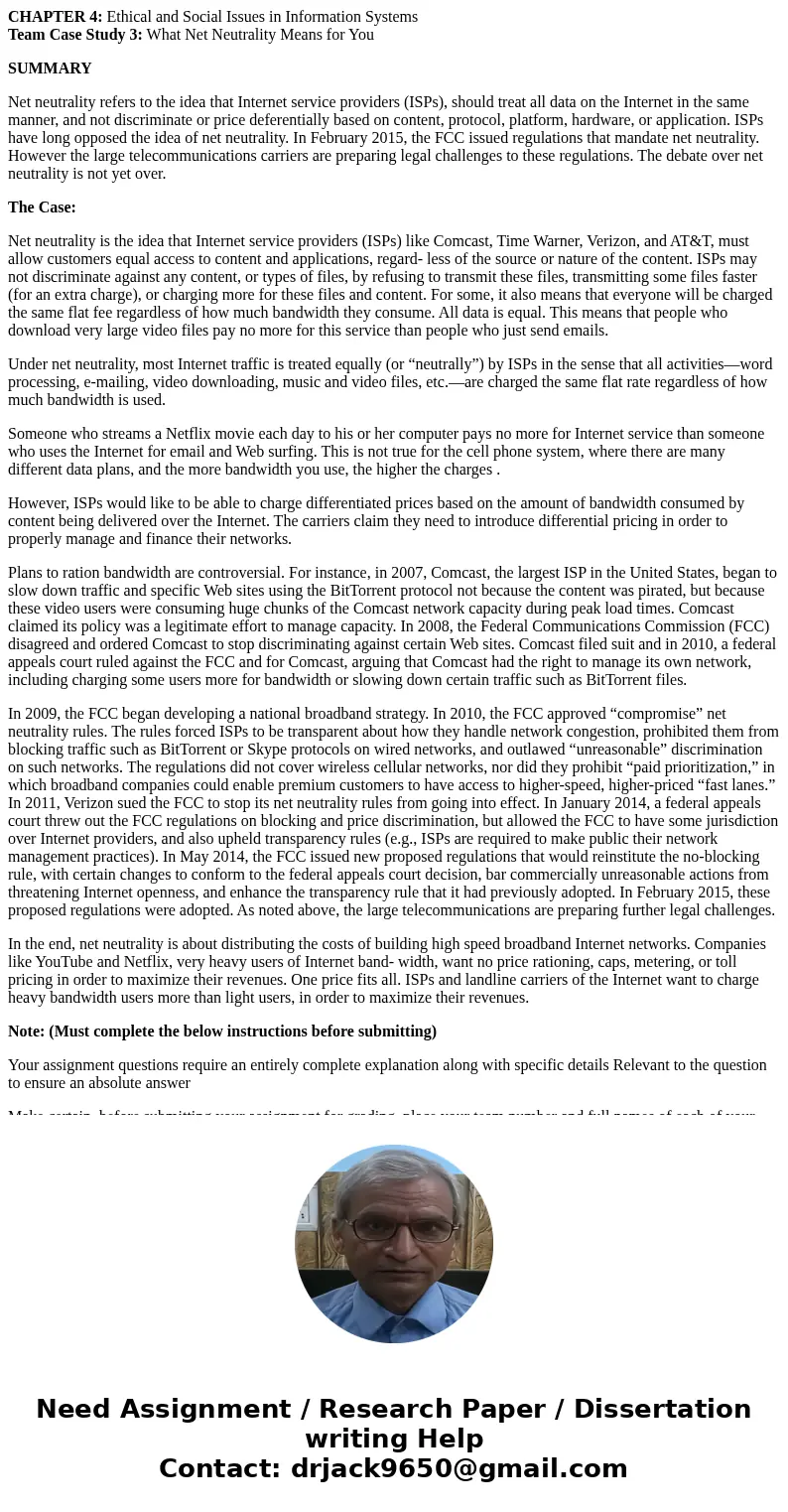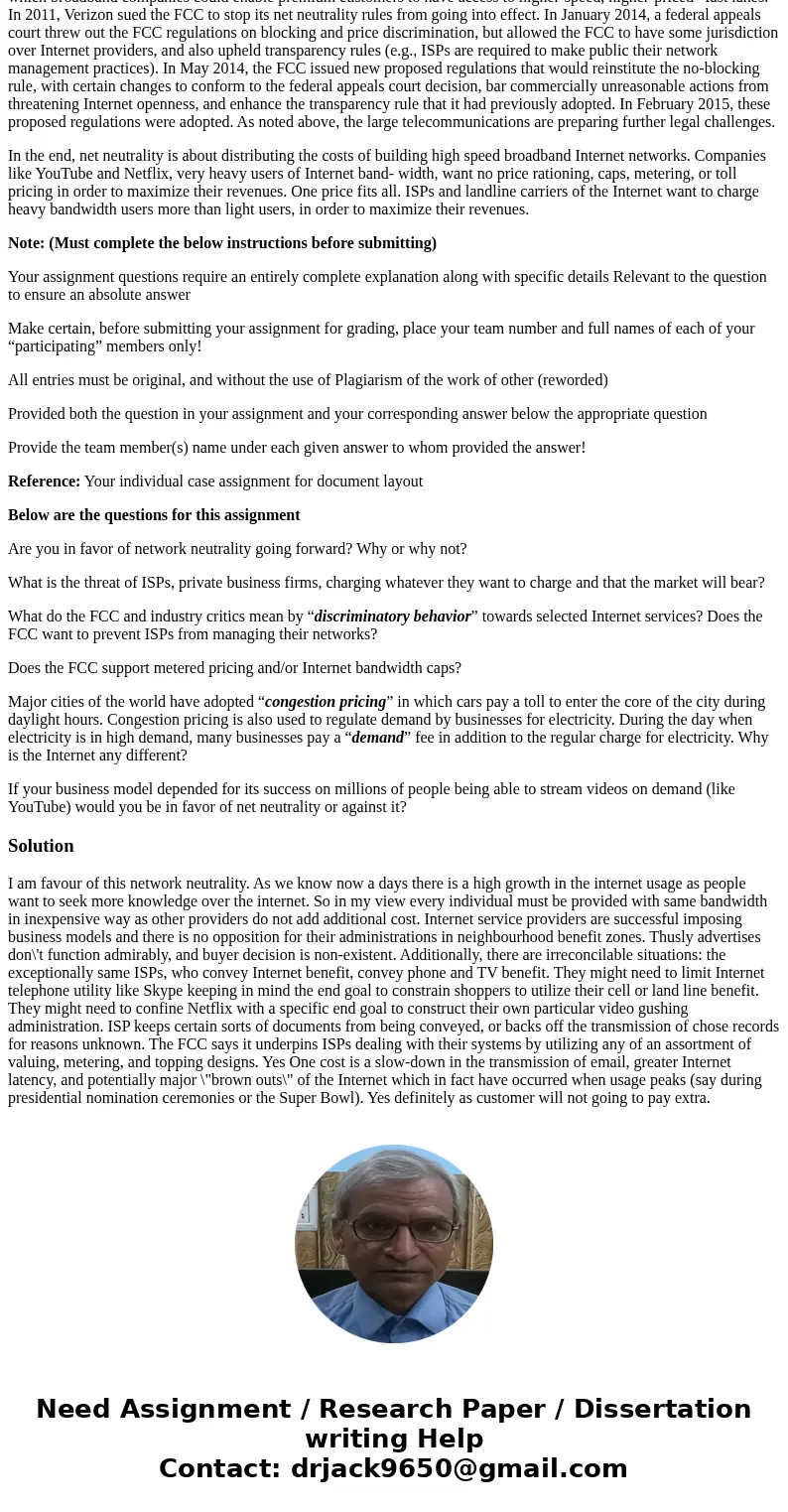CHAPTER 4 Ethical and Social Issues in Information Systems T
CHAPTER 4: Ethical and Social Issues in Information Systems
Team Case Study 3: What Net Neutrality Means for You
SUMMARY
Net neutrality refers to the idea that Internet service providers (ISPs), should treat all data on the Internet in the same manner, and not discriminate or price deferentially based on content, protocol, platform, hardware, or application. ISPs have long opposed the idea of net neutrality. In February 2015, the FCC issued regulations that mandate net neutrality. However the large telecommunications carriers are preparing legal challenges to these regulations. The debate over net neutrality is not yet over.
The Case:
Net neutrality is the idea that Internet service providers (ISPs) like Comcast, Time Warner, Verizon, and AT&T, must allow customers equal access to content and applications, regard- less of the source or nature of the content. ISPs may not discriminate against any content, or types of files, by refusing to transmit these files, transmitting some files faster (for an extra charge), or charging more for these files and content. For some, it also means that everyone will be charged the same flat fee regardless of how much bandwidth they consume. All data is equal. This means that people who download very large video files pay no more for this service than people who just send emails.
Under net neutrality, most Internet traffic is treated equally (or “neutrally”) by ISPs in the sense that all activities—word processing, e-mailing, video downloading, music and video files, etc.—are charged the same flat rate regardless of how much bandwidth is used.
Someone who streams a Netflix movie each day to his or her computer pays no more for Internet service than someone who uses the Internet for email and Web surfing. This is not true for the cell phone system, where there are many different data plans, and the more bandwidth you use, the higher the charges .
However, ISPs would like to be able to charge differentiated prices based on the amount of bandwidth consumed by content being delivered over the Internet. The carriers claim they need to introduce differential pricing in order to properly manage and finance their networks.
Plans to ration bandwidth are controversial. For instance, in 2007, Comcast, the largest ISP in the United States, began to slow down traffic and specific Web sites using the BitTorrent protocol not because the content was pirated, but because these video users were consuming huge chunks of the Comcast network capacity during peak load times. Comcast claimed its policy was a legitimate effort to manage capacity. In 2008, the Federal Communications Commission (FCC) disagreed and ordered Comcast to stop discriminating against certain Web sites. Comcast filed suit and in 2010, a federal appeals court ruled against the FCC and for Comcast, arguing that Comcast had the right to manage its own network, including charging some users more for bandwidth or slowing down certain traffic such as BitTorrent files.
In 2009, the FCC began developing a national broadband strategy. In 2010, the FCC approved “compromise” net neutrality rules. The rules forced ISPs to be transparent about how they handle network congestion, prohibited them from blocking traffic such as BitTorrent or Skype protocols on wired networks, and outlawed “unreasonable” discrimination on such networks. The regulations did not cover wireless cellular networks, nor did they prohibit “paid prioritization,” in which broadband companies could enable premium customers to have access to higher-speed, higher-priced “fast lanes.” In 2011, Verizon sued the FCC to stop its net neutrality rules from going into effect. In January 2014, a federal appeals court threw out the FCC regulations on blocking and price discrimination, but allowed the FCC to have some jurisdiction over Internet providers, and also upheld transparency rules (e.g., ISPs are required to make public their network management practices). In May 2014, the FCC issued new proposed regulations that would reinstitute the no-blocking rule, with certain changes to conform to the federal appeals court decision, bar commercially unreasonable actions from threatening Internet openness, and enhance the transparency rule that it had previously adopted. In February 2015, these proposed regulations were adopted. As noted above, the large telecommunications are preparing further legal challenges.
In the end, net neutrality is about distributing the costs of building high speed broadband Internet networks. Companies like YouTube and Netflix, very heavy users of Internet band- width, want no price rationing, caps, metering, or toll pricing in order to maximize their revenues. One price fits all. ISPs and landline carriers of the Internet want to charge heavy bandwidth users more than light users, in order to maximize their revenues.
Note: (Must complete the below instructions before submitting)
Your assignment questions require an entirely complete explanation along with specific details Relevant to the question to ensure an absolute answer
Make certain, before submitting your assignment for grading, place your team number and full names of each of your “participating” members only!
All entries must be original, and without the use of Plagiarism of the work of other (reworded)
Provided both the question in your assignment and your corresponding answer below the appropriate question
Provide the team member(s) name under each given answer to whom provided the answer!
Reference: Your individual case assignment for document layout
Below are the questions for this assignment
Are you in favor of network neutrality going forward? Why or why not?
What is the threat of ISPs, private business firms, charging whatever they want to charge and that the market will bear?
What do the FCC and industry critics mean by “discriminatory behavior” towards selected Internet services? Does the FCC want to prevent ISPs from managing their networks?
Does the FCC support metered pricing and/or Internet bandwidth caps?
Major cities of the world have adopted “congestion pricing” in which cars pay a toll to enter the core of the city during daylight hours. Congestion pricing is also used to regulate demand by businesses for electricity. During the day when electricity is in high demand, many businesses pay a “demand” fee in addition to the regular charge for electricity. Why is the Internet any different?
If your business model depended for its success on millions of people being able to stream videos on demand (like YouTube) would you be in favor of net neutrality or against it?
Solution
I am favour of this network neutrality. As we know now a days there is a high growth in the internet usage as people want to seek more knowledge over the internet. So in my view every individual must be provided with same bandwidth in inexpensive way as other providers do not add additional cost. Internet service providers are successful imposing business models and there is no opposition for their administrations in neighbourhood benefit zones. Thusly advertises don\'t function admirably, and buyer decision is non-existent. Additionally, there are irreconcilable situations: the exceptionally same ISPs, who convey Internet benefit, convey phone and TV benefit. They might need to limit Internet telephone utility like Skype keeping in mind the end goal to constrain shoppers to utilize their cell or land line benefit. They might need to confine Netflix with a specific end goal to construct their own particular video gushing administration. ISP keeps certain sorts of documents from being conveyed, or backs off the transmission of chose records for reasons unknown. The FCC says it underpins ISPs dealing with their systems by utilizing any of an assortment of valuing, metering, and topping designs. Yes One cost is a slow-down in the transmission of email, greater Internet latency, and potentially major \"brown outs\" of the Internet which in fact have occurred when usage peaks (say during presidential nomination ceremonies or the Super Bowl). Yes definitely as customer will not going to pay extra.

 Homework Sourse
Homework Sourse